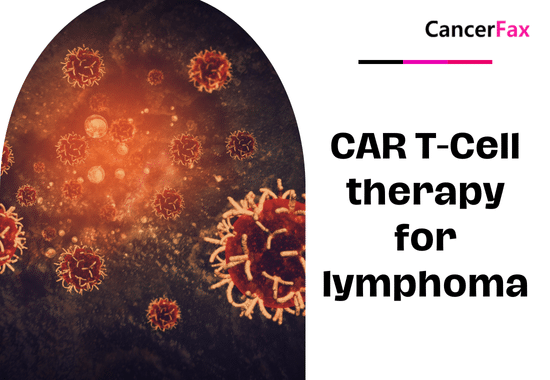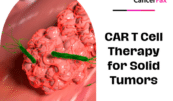CAR T-Cell therapy for lymphoma
Introduction
CAR T cell therapy has been a game-changer in the treatment of certain lymphomas, more so in patients relapsing or refractory to conventional therapies. This has been quite successful in targeting cancer cells within clinical trials by engineering a patient’s T cells to express chimeric antigen receptors. This review addresses the application of CAR T cell therapy in the treatment of lymphoma, highlighting stories of success, clinical outcomes, challenges, and future directions.
Understanding Lymphoma
Lymphoma is a type of cancer that arises from the lymphatic system, mainly from lymphocytes, which are one type of white blood cell. There are two major types of lymphoma: Hodgkin lymphoma and non-Hodgkin lymphoma. The former has been treated mainly with CAR T cell therapy in some subtypes of NHL, such as diffuse large B-cell lymphoma, primary mediastinal B-cell lymphoma, and follicular lymphoma.
CAR T Cell Therapy in DLBCL
Case Studies and Success Stories:
Approval and Use:
Two CAR T cell therapies, Yescarta (axicabtagene ciloleucel) and Kymriah (tisagenlecleucel), are approved by the FDA for the treatment of DLBCL. They have quite a promising record in patients who have not shown any response to any other therapy.
Clinical Outcomes:
Clinical trials demonstrated that the majority of patients treated with CAR T cell therapy achieved a state of complete remission. For instance, approximately 40% of DLBCL patients enrolled in the ZUMA1 trial achieved a complete remission after treatment with Yescarta.
Mechanism of Action:
Target Antigen:
One such target for the therapy is the CD19 antigen, which is expressed on the surface of B cells, including malignant B cells in DLBCL. The CAR T cells are then engineered to recognize and bind to CD19, leading to the destruction of those cancer cells.
Immune Response:
By binding to CD19, CAR T cells are activated and start proliferating, producing cytotoxic molecules that cause apoptosis in those very cancer cells.
Challenges and Limitations:
Side Effects:
The vast majority are severe, and their management is needed during therapy; these include CRS and neurotoxicity.
Resistance and Relapse: Patients may suffer relapses resulting from mechanisms like antigen escape, whereby the cancer cells lose the CD19 marker.
CAR T Cell Therapy in Primary Mediastinal B-Cell Lymphoma (PMBCL)
Current Research and Clinical Trials:
Clinical Outcomes:
Several clinical trials involving CAR T cell therapy in PMBCL have shown promising results. This treatment has given good response rates to patients with relapsed or refractory PMBCL.
Mechanism and Efficiency:
Much like in DLBCL, the therapeutic function of CAR T cell therapy in PMBCL is to destroy the malignant B cells through the CD19 antigen.
Challenges and Limitations:
Tumor Microenvironment:
The dense and fibrous nature of the tumors in PMBCL can make it difficult for the CAR T cells to infiltrate and kill the cancer cells effectively.
CAR T Cell Therapy in Follicular Lymphoma
Current Research and Clinical Trials:
Clinical Outcomes:
Early phase clinical trials demonstrated that CAR T cell therapy was able to induce high response rates in patients with r/r FL. Many patients achieved a CR.
Mechanism and Efficacy:
It specifically targets CD19 or other antigens, such as CD20, and mediates the depletion of malignant B cells in FL.
Challenges and Limitations:
Long-term Effectiveness:
One of the major aspects of ongoing research is securing its long-term effectiveness with the persistence of CAR T cells to avoid relapse.
Overcoming Challenges of CAR T Cell Therapy in Lymphoma
Antigen Escape:
Dual-Targeting CARs:
In an effort to circumvent antigen escape, the generation of CAR T cells that are capable of targeting two dissimilar antigens is being developed. For instance, chimeric antigen receptors that are directed against CD19 and CD20 are under study.
Targeting Multiple Antigens:
Many ongoing trials involve CAR T cells that target alternative antigens, such as CD22, as a means to bypass antigen loss–mediated resistance.
Tumor Microenvironment:
Infiltration Enhancement:
Combinations of CAR T cells with pharmacological agents modulating the tumor stroma could be explored for the improvement of CAR T cell infiltration into the tumor microenvironment.
Armored CAR T Cells:
Genetic manipulation of the CAR T cells to secrete cytokines or any other factors that alter the TME can enhance therapeutic potential.
Reducing Side Effects:
Cytokine Release Syndrome:
Life-threatening CRS, characterized by the massive release of cytokines. Treatment includes the use of tocilizumab, an anti-IL-6 receptor antibody, with corticosteroids for symptomatic management.
Neurotoxicity:
Confusion, seizures, and encephalopathy may be seen. These are managed through supportive care and corticosteroids.
Future Directions
Next Generation CAR T Cells:
Improved Design:
Next-generation CARs are being developed with improved signaling domains and safety features to increase efficacy while reducing toxicity.
CAR T Cells Universal:
Off-the-shelf CAR T cells that don’t require any patient-specific modification are being investigated for their reach and reduction in cost.
Combination Therapies:
Synergistic Approaches:
Combinations of CAR T cell therapy with other modalities, such as checkpoint inhibitors, chemotherapy, or radiation, could yield synergies in terms of augmenting efficacy and overcoming resistance.
Immune Modulation:
Approaches to immune modulation, such as using an oncolytic virus or depleting the immunosuppressive cells with drugs, are being explored to improve CAR T cell function.
Expanding Indications
Solid Tumors:
Efforts are being made to extend CAR T cell therapy to solid tumors by identifying the right targets and overcoming inherent issues thrown up by the tumor microenvironment.
What is the cost of CAR T Cell therapy for Lymphoma?
In the United States, a CAR T-cell therapy could cost anywhere from $500,000 to $1,000,000. Many factors contribute to the cost of apheresis for taking T-cells, production of CAR T-cells, hospitalization, imaging studies, and medications. Another indirect cost to the patient could be that he or she will have to stay near the treatment centers, necessitating travel costs, housing, and caregiver support.
The cost of CAR T-Cell therapy for lymphoma in China ranges between $ 65,000 and $ 250,000 USD. China offers the cheapest CAR T-Cell therapy, as there are several clinical trials ongoing and they offer the therapy to patients absolutely free. The patient has to only pay the cost of hospitalization. Top CAR T-Cell therapy hospitals in China are conducting these trials, and patients can connect with CancerFax to get into these trials. Patients can WhatsApp their medical reports to +1 213 789 56 55.
Even as India developed its own CAR T-cell therapies, India’s therapy came much cheaper. The cost of the homegrown therapy, NexCAR19, will be about $50,000, nearly one-tenth the price of similar treatments in the U.S. Partly, this cost reduction could be because of the ability to manufacture it locally and with indigenous technology, making this CAR T-cell therapy more accessible to patients in India.
LIST OF CAR T CELL THERAPIES AVAILABLE IN THE MARKET WITH THEIR PRICE IN RESPECTIVE COUNTRIES (USD)
|
||||||
| S.No. | CAR T-Cell therapy | Brand Name | Company | Disease | Country | Cost |
| 1 | Tisagenlecleucel | Kymriah | Novartis | BALL / Lymphoma | USA | 500-800,000 |
| Singapore | 400-500,000 | |||||
| South-Korea | 400-500,000 | |||||
| China | 400-500,000 | |||||
| Australia | 400-500,000 | |||||
| Israel | 400-500,000 | |||||
| 2 | Idecabtagene vicleucel | ABECMA® | BMS | Multiple-Myeloma | USA | 500-800,000 |
| Singapore | 400-500,000 | |||||
| South-Korea | 400-500,000 | |||||
| China | 400-500,000 | |||||
| Australia | 400-500,000 | |||||
| Israel | 400-500,000 | |||||
| 3 | Lisocabtagene maraleucel | BREYANZI® | BMS | DLBCL | USA | 500-800,000 |
| Singapore | 400-500,000 | |||||
| South-Korea | 400-500,000 | |||||
| China | 300-400,000 | |||||
| Australia | 400-500,000 | |||||
| Israel | 400-500,000 | |||||
| 4 | Ciltacabtagene autoleucel | CARVYKTITM | Janssen Biotech (J&J) | Multiple-Myeloma | USA | 500-800,000 |
| Singapore | 400-500,000 | |||||
| South-Korea | 400-500,000 | |||||
| China | 250-300,000 | |||||
| Australia | 400-500,000 | |||||
| Israel | 400-500,000 | |||||
| 5 | Axicabtagene ciloleucel | YESCARTATM | Kite Pharma | DLBCL | USA | 500-800,000 |
| Singapore | 400-500,000 | |||||
| South-Korea | 400-500,000 | |||||
| China | 250-300,000 | |||||
| Australia | 400-500,000 | |||||
| Israel | 400-500,000 | |||||
| 6 | Equecabtagene Autoleucel | FUCASO | IASO Biotechnology | Multiple-Myeloma | China | 250-300,000 USD |
| USA | 500-800,000 | |||||
| 7 | Zevorcabtagene autoleucel | Zevor-Cel | Carsgen | Multiple-Myeloma | China | 250-300,000 USD |
| USA | 500-800,000 | |||||
| 8 | CAR T Cell therapy | Trials | Multiple companies | BALL | China | 75-90,000 |
| DLBCL | China | 75-90,000 | ||||
| Multiple Myeloma | China | 75-90,000 | ||||
| Auto-immune disorders | China | 75-90,000 | ||||
| TALL | China | 75-90,000 | ||||
| 9 | CAR T Cell therapy | NexCAR19 | Immunoact | BALL / DLBCL | India | 60,000 |
Conclusion
CAR T cell therapy has big potential for treating a number of lymphomas, particularly DLBCL, PMBCL, and FL. Though challenges still remain in the field of CAR T cell therapy, ongoing research and new strategies are constantly developing to increase its efficacy and safety.
The future of CAR T cell therapy for lymphoma will be bright for continuing to improve outcomes and durable remissions for an ever-growing patient population. In the evolution of the field, CAR T cell therapy has stood for the power of immunotherapy against cancer, offering new hope to patients with otherwise incurable malignancies.
Dr. Nishant Mittal is a highly accomplished researcher with over 13 years of experience in the fields of cardiovascular biology and cancer research. His career is marked by significant contributions to stem cell biology, developmental biology, and innovative research techniques.
Research Highlights
Dr. Mittal's research has focused on several key areas:
1) Cardiovascular Development and Regeneration: He studied coronary vessel development and regeneration using zebrafish models1.
2) Cancer Biology: At Dartmouth College, he developed zebrafish models for studying tumor heterogeneity and clonal evolution in pancreatic cancer.
3) Developmental Biology: His doctoral work at Keio University involved identifying and characterizing medaka fish mutants with cardiovascular defects.
4) Stem Cell Research: He investigated the effects of folic acid on mouse embryonic stem cells and worked on cryopreservation techniques for hematopoietic stem cells.
Publications and Presentations
Dr. Mittal has authored several peer-reviewed publications in reputable journals such as Scientific Reports, Cardiovascular Research, and Disease Models & Mechanisms1. He has also presented his research at numerous international conferences, including the Stanford-Weill Cornell Cardiovascular Research Symposium and the Weinstein Cardiovascular Development Conference.
In summary, Dr. Nishant Mittal is a dedicated and accomplished researcher with a strong track record in cardiovascular and cancer biology, demonstrating expertise in various model systems and a commitment to advancing scientific knowledge through innovative research approaches.
- Comments Closed
- August 2nd, 2024






B-cell lymphoma therapy, CAR-T cell treatment, CAR-T therapy for lymphoma, CD19 Targeted Therapy, FDA-approved CAR-T for lymphoma, Lymphoma immunotherapy, Non-Hodgkin lymphoma treatment, Relapsed lymphoma options
CancerFax is the most trusted online platform dedicated to connecting individuals facing advanced-stage cancer with groundbreaking cell therapies.
Send your medical reports and get a free analysis.
🌟 Join us in the fight against cancer! 🌟
Привет,
CancerFax — это самая надежная онлайн-платформа, призванная предоставить людям, столкнувшимся с раком на поздних стадиях, доступ к революционным клеточным методам лечения.
Отправьте свои медицинские заключения и получите бесплатный анализ.
🌟 Присоединяйтесь к нам в борьбе с раком! 🌟